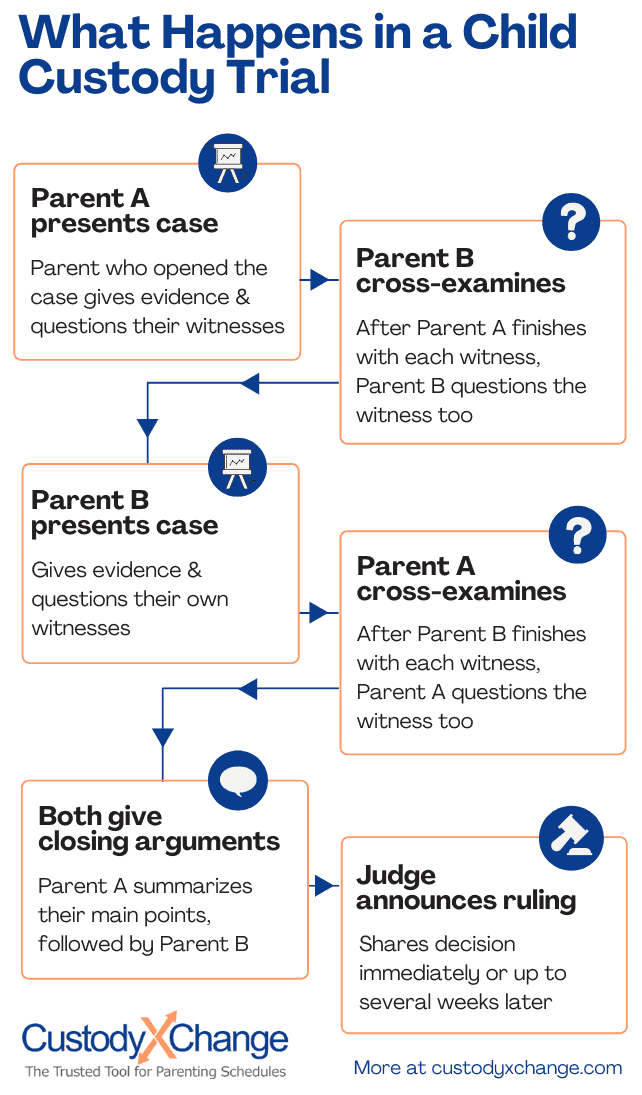Colorado Custody and Divorce Trials: What To Expect
If you and the other parent agree how to care for your child, you can settle and won't need a trial. Most parents settle their Colorado divorce and parenting responsibilities cases.
But if you can't settle, you'll go to trial, where you'll call witnesses, present evidence and receive a final decision from a judge.
Timing of a trial
Your trial will likely happen six to 12 months after you open your case. This will allow you time to try to resolve your differences through mediation, gather evidence and get a parenting evaluation from a child custody expert.
You may be asked to participate in a settlement conference before trial. This is like mediation, but a judge presides. If you don't successfully settle there, you'll be scheduled for trial with a different judge. The trial will be about a month after your conference.
Preparing for trial
Several months to go
If you haven't sought legal advice yet, now is the time. There are low-cost resources for people who can't afford a lawyer.
In trial, you'll have to prove to a judge that your requests are best for your child. So, first, you need to gather information. Follow these tips for evidence:
- Official documents (e.g., health records) and more personal evidence (e.g., family videos) can both work when relevant.
- Always propose a parenting plan and schedule.
- Request your previous court records online if you plan to cite them.
- If your child has a chronic illness or disability, demonstrate how you've prepared for their short- and long-term care.
- You can use a co-parenting app like Custody X Change to help you organize evidence.
Start to plan who you'll call as witnesses. If your case has a child and family investigator or parenting responsibilities evaluator, they'll likely be a key witness. Judges do not usually allow children to testify and don't even like to interview them privately. Keep in mind that witnesses can't talk about anything they've heard secondhand.
At least nine weeks before trial, you and the other parent must serve each other with any requests for documents, any questions you want them to answer under oath (interrogatories) and a list of anyone you might call as a witness. You each have 35 days to respond. You may be able to serve your requests and responses electronically.
Consult the trial prep forms that Colorado provides online.
A month to go
You and the other parent have an ongoing duty to update each other about changes in your finances. Although there's no required timetable, exchanging disclosures about a month before trial ensures that you have current information. You can use the Sworn Financial Statement (JDF 1111 SC).
If you need a language interpreter, make sure the court knows this at least 30 days before your trial.
Two weeks to go
If you need to subpoena a person or organization for documents, do this at least two weeks before your trial date.
One week to go
At least seven days before the hearing, you must file important information:
- Pretrial Statement (JDF 1129)
- Witness List (JDF 71)
- Exhibit List (JDF 72)
- The exhibits themselves (e.g., your proposed parenting plan, school and medical records, photos)
In your Pretrial Statement, identify your ongoing disagreements and briefly argue for your proposed solution. Usually, you and the other parent write separate statements and exchange copies, but if at least one of you has a lawyer, they may prepare a shared document called a Joint Trial Management Certificate.
Turn everything in a few days early if possible. If you miss the deadline for your exhibit list, you'll only be able to talk about the information you had planned to present, not show it.
Two days to go
If someone in Colorado won't testify voluntarily, subpoena them up to 48 hours before the trial, and they'll have to testify.
Some people appreciate a subpoena because it proves their testimony is required — which, for example, helps them request time off work.
What happens in court
The trial may begin with a brief preliminary hearing for any last-minute questions. Then will come the contested hearing (aka the final hearing or permanent orders hearing).
The entire trial is open to the public. Witnesses, however, can't enter the room until it is their turn to testify.
If a child's legal representative has been involved in the case, they behave like any other lawyer in the case. They can call witnesses, make opening and closing statements, etc.
A simple case may wrap up within several hours, but many cases last a full day. A complex case — for example, one with testimony from multiple expert witnesses — may last two days.

Reaching a decision
Your case is decided by a judge, not a jury.
Don't expect the court to name one proposed parenting plan the winner. It's common for the judge to order a blend of each parent's plan.
After the trial, you and the other parent will receive a copy of the court order, including the final parenting plan, in the mail. You have the right to request copies in the future.
Your court order won't be public (unless the court finds a "good cause" to release it). Consider places you'd like the information to be kept — for example, your child's school — and provide copies.
Using technology for your trial
Parenting trials require serious organization.
You may need to propose parenting time schedules, suggest a parenting plan, present messages from the other parent, and more.
The Custody X Change online app lets you create and manage all of these elements in one place. With customizable parenting time calendars, a parenting plan template, printable parent-to-parent messaging and beyond, it helps you prepare for every step of your case.
Take advantage of technology to get what's best for your child.
